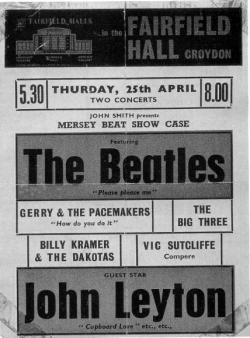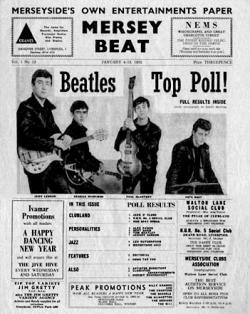Brow Beat is following the Beatles in “real time,” 50 years later, from their first chart-topper to their final rooftop concert. 50 years ago this month, The Beatles played their first “Mersey Beat Showcase,” spreading the sound of Liverpool.

Promotional image via the Beatles Bible.
Brian Epstein had an idea. The Beatles had just lodged their first No. 1 hit on the charts, and Gerry and the Pacemakers, another band off his burgeoning roster, had a sure hit on the way—“How Do You Do It?” The Beatles refused to release that song themselves, considering it too old-fashioned, but the Pacemakers took it to No. 1. Looking over the list of promising names in his lineup, Epstein thought: Why not get them all together?
So on March 7, 1963, the Beatles, the Pacemakers, the Big Three, and Billy J. Kramer with the Dakotas all travelled—along with a few dozen local fans—to Nottingham, a few hours east. There they played the first show of what became a tour called the “Mersey Beat Showcase,” delivering what soon conquered the U.K. as the “Liverpool sound” or the “Mersey sound.”
But what was that sound? If you asked the Beatles and their similarly-coiffed and -clad young friends at the time, they probably wouldn’t have had a good answer. These bands might have shared outfits and haircuts and an early affection for skiffle music, but was their sound really so distinctive? After all, much of their repertoire consisted of covers by rock, R&B, and doo-wop acts (their harmonies were often inspired by the latter). Lennon himself would later say, “We don’t think there is such a thing as the Mersey Sound. … It just so happened we came from Liverpool and they looked for the nearest river and named it.”

© Copyright Bill Harry
In their own attempts to define the sound, Mersey bands pointed to the “chunk chunk on the drums” and a gut-rattling “thump thump on the bass.” (You can watch the artists offer these descriptions about 3 minutes into the video below.) They also had lineups just like the Beatles’, which soon became the standard template for every rock band—four or five guys, among them a lead guitarist, a rhythm guitarist, a bassist, and a drummer. Their names, too, often followed a similar format: Other Mersey beat groups included The Undertakers, The Swinging Blue Jeans, and The Mojos.
And they didn’t hide their Northern and generally working-class origins. Some people might have been looked down on their “Scouse” accents (a term borrowed from the name for a stew popular with sailors), but they wore them proudly, dismissing Southern English groups as stuffy. This attitude was encouraged in part by the larger English artistic movement of kitchen-sink realism—films like Saturday Night and Sunday Morning and A Taste of Honey inspired the Beatles, so much that they recorded the title track from A Taste of Honey for their debut album. Soon the Daily Worker, the newspaper of the British Communist Party, hailed the “Mersey Sound” as “the voice of 80,000 crumbling houses and 30,000 people on the dole.”
Finally, they had their own newspaper, The Mersey Beat. Launched by 22-year-old Bill Harry on July 6, 1961, the newspaper, or fanzine, was one of the first Northern publications to cover rock ‘n’ roll, and it focused on the young rock bands of the Liverpool scene. Especially the Beatles. Harry was Lennon’s former roommate, and the first edition ran an editorial from Lennon, which he had titled “Being a Short Diversion on the Dubious Origins of the Beatles,” on the second page. (The piece was “translated from the John Lennon,” as a note below the title explained.) With his signature sense of humor, Lennon addressed, among other questions, the issue of how the Beatles got their name:
Many people ask what are Beatles? Why Beatles? Ugh, Beatles, how did the name arrive? So we will tell you. It came in a vision—a man appeared on a flaming pie and said unto them: ‘From this day on you are Beatles.’ ‘Thank you, Mister Man, they said, thanking him.
The Mersey Beat proved crucial in cementing the Liverpool scene. In fact, it’s how Brian Epstein first learned about the Beatles. After he got the group their recording contract with EMI’s Parlophone label, one of the first things he did was send a telegram to Bill Harry with the news.
But even before they signed with Parlophone, the Beatles were at the forefront of the Liverpool groups. When Mersey Beat ran its first poll to determine the most popular Merseyside band, Gerry & the Pacemakers and others placed highly, but the Beatles came out on top.
For more, you can watch the BBC’s full 1998 documentary on “The Mersey Sound”
Read more from Blogging the Beatles
The Beatles Become the Headliners
The Beatles Become Pop Professionals
Did the Beatles Get Screwed?
The Beatles Race Against the Clock
The Beatles Bring Back Rock Rawness
The Forgotten Songwriter Who Inspired the Beatles
The Beatles Record Their Debut Album